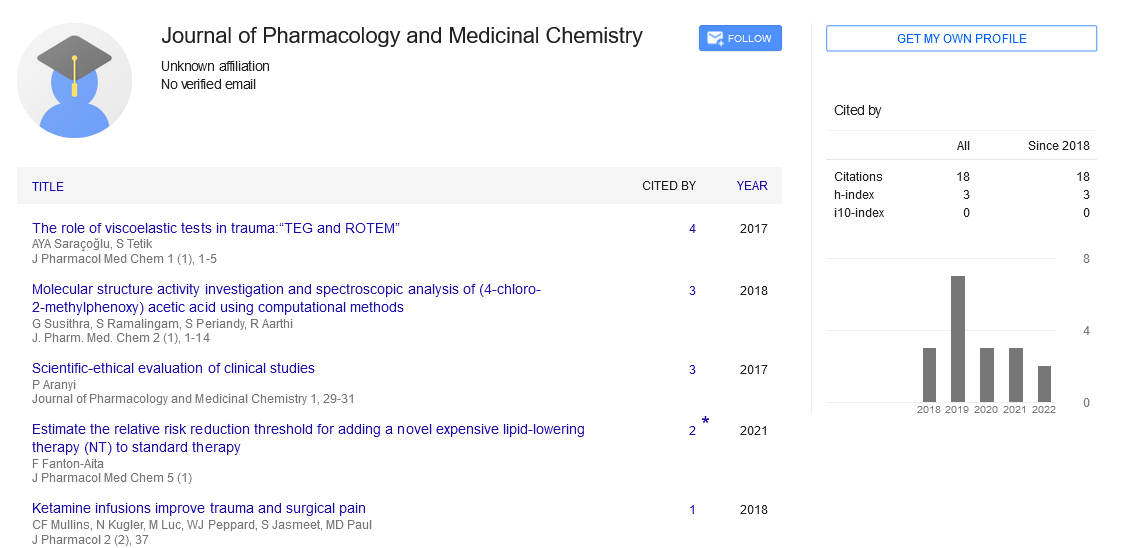Impact of integration: Pharmaceutical medicinal chemistry and pharmacology
Received: 27-Oct-2017 Accepted Date: Oct 28, 2017; Published: 31-Oct-2017
Citation: Ali HS. Impact of integration: Pharmaceutical medicinal chemistry and pharmacology. J Pharmacol Med Chem 2017;1(1):11.
This open-access article is distributed under the terms of the Creative Commons Attribution Non-Commercial License (CC BY-NC) (http://creativecommons.org/licenses/by-nc/4.0/), which permits reuse, distribution and reproduction of the article, provided that the original work is properly cited and the reuse is restricted to noncommercial purposes. For commercial reuse, contact reprints@pulsus.com
Editorial
Recently, in all years, institutions of higher education acrossnationally and internationally, have recognized that publishing isthe core of the academic career attaining international ranking of the institution. That is why, for these institutions to build a high standard academic reputation put emphasis on interdisciplinary and multidisciplinary research projects related to drug design, development and targeted delivery systems. On the other hand, academicians and researchers seek through professional development and profile publications seek to boost the professional careers. In area of drug design and development both pharmaceutical medicinal chemistry and pharmacology act as a complement to each other, eventually the research will have impact and make a change in various areas such as public health, environment, industry etc.
Medicinal chemistry is the branch of chemistry that explains how drugs act and shows how they can be designed and developed.
Medicinal chemistry is a multidisciplinary science involving comprehensive knowledge in organic chemistry, physical chemistry, biochemistry, physiology, pharmacology, microbiology, mathematics. Pharmacology is concerned with the study of drug action on the cell, tissue, organ or organism. The aim of dug design and development is to produce efficacious and highly selective (and hopefully specific) pharmacophores and then find ways of delivering them, through ADMEphore design and development, to the site of required biological action. Elimination of the drug from the body is the next step in drug design and development. This can also be controlled by implementing the appropriate approaches of chemical functional group inclusion in the drug molecule.
In drug discovery linking the concepts of pharmacology and medicinal chemistry together, many information and data can be generated, such as:
•Predict the physicochemical properties of a drug(medicinal compound) by inspecting the drug chemicalstructure.
•Describe how the pharmacokinetics properties of a drugcan be modified by modifying some physicochemicalproperty upon modifying some chemical functional group.
•Predict the mode of binding of a drug to its receptor in thebody based on the structures of the drug molecule and the receptor and accordingly how pharmacodynamic properties can be influenced.
•Predict the major metabolic pathways of medicinal agentsand the expected activity, or lack of it, or toxicity of themajor metabolites and how chemical modifications can bemade to avert toxic metabolite formation and how activemetabolites can be developed into drugs.
•Explain the effect of stereochemistry of a drug molecule onits binding to receptor(s) and how pure isomers can beused to advantage and when isomeric mixtures can be used
•Suggest chemical modifications on drug molecules andpredict the effects of those modifications based on theprinciples of drug design.
•In academic institution, many studies have reported thatintegration and collaboration between pharmacology andmedicinal chemistry courses increase students‘understanding, satisfaction and success. Students acquiredeep knowledge regarding the link between theidentification of biological and chemical compounds andmolecules’ functional groups, molecular structure andphysical, chemical and technological properties and thebiological effects of the compounds.
In clinical setting the coining of pharmacology and medicinal chemistry drug delivery principles would result in the required therapeutic outcomes of medicines. Advantages of this integration resulted in solving many issues and challenges in all fields of the pharmacy profession: community, hospital and industrial practices.
Therefore, researchers, academicians and scientists they are looking for validation of all their results and disseminate their findings to the public in the research community. Pharmacology and medicinal chemistry journal will address various concepts and principles on techniques of organic synthesis, analysis, validation, characterization, and pharmacological evaluation of compounds. In addition to metabolism, drug receptor interactions and drug targeting.





